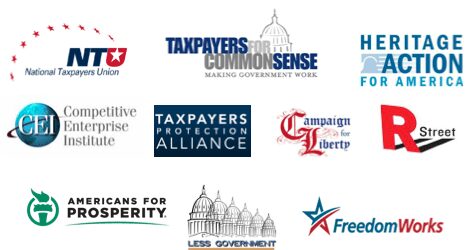
TPA Joins Coalition Opposing Reform-less Water Resources Reform and Development Act
Taxpayers Protection Alliance
October 23, 2013

This week, the House of Representatives will be considering a bill dealing with projects and policies directly relating to the U.S. Army Corps of Engineers. Although the title contains the word “reform,” the substance of the bill couldn’t be more misleading. The Water Resources Reform and Development Act of 2013 is legislation that fails to identify or seriously correct the many problems that face the U.S. Army Corps of Engineers civil works program. A backlog totaling $60-$80 billion dollars on projects, some dating back to 2007 authorization; increased spending to ports where traffic flow doesn’t necessarily justify the increase; and a House version of the much maligned ‘Kentucky Kickback’ (added to the Senate deal to re-open the government and raise the debt ceiling) costing more than $2 billion dollars to the taxpayers. These concerns were outlined in this letter sent yesterday by Taxpayers for Commonsense urging the House to oppose the WRDA 2013. TPA, along with other free-market and liberty oriented groups Americans for Prosperity, Campaign for Liberty, Competitive Enterprise Institute, FreedomWorks, Heritage, Action for America, Less Government, National Taxpayers Union, and the R Street Institute joined the effort.
View the full letter below:
Oppose Reform-less Water Resources Reform and Development Act
October 22, 2013
Dear Representative,
We understand that H.R. 3080, the Water Resources Reform and Development Act of 2013, will be on the House floor as early as Wednesday October 23. This bill authorizes water projects, studies, and policies for the U.S. Army Corps of Engineers. H.R. 3080 fails to deliver on the reform moniker and we oppose its passage. Here are several concerns:
Backlog – The Corps has a $60-80 billion project backlog and receives less than $2 billion in construction funding annually. Even before the predictable increase in authorizations as this bill goes through the process, this legislation would only shave a few billion dollars off the backlog. In addition, the legislation explicitly protects the roughly $28 billion worth of projects that were authorized in WRDA 2007, even those that have yet to see a dime of construction funding 6 years after passage.
Authorization – We appreciate that the legislation sets up an authorization system that would not require earmarks. However, there are no sidebars on the system. Local interests would suggest projects to Corps districts that would have to study them and submit recommended projects to Congress. Without a prioritization system and criteria and with little restriction on what should or should not be submitted, the system could overwhelm Corps districts. In addition, any project that fits in the Corps mission and is estimated to return even just one penny on the dollar would be submitted to Congress. Lawmakers are not good at saying no to constituent projects. It would be far better to build in certain criteria, including significant return on investment, to the authorization system.
Forced Increased Spending – The Harbor Maintenance Trust Fund has received far more revenue than has been spent in recent years. The appropriate response to that is to reform the major cross-subsidies or reduce the tax rate or both. Instead, H.R. 3080 mandates greater payouts from the trust fund, which will inevitably cannibalize funding from other Corps mission areas. In addition, the bill allows federal spending on traditionally non-federal projects like confined sediment disposal facilities and berth (“driveway”) dredging. The bill also creates an “emerging harbor” category, directing as much as 10 percent of the funding to ports with less than 1,000,000 tons of traffic. According to the most recent port data, that would be a set-aside for ports ranked 136th and less in traffic, which is hardly a national priority.
Kentucky Kickback: the Sequel – H.R. 3080 includes a provision to increase the authorization for the Olmsted Lock and Dam project from $775 million to $2.3 billion (notably, less than the $2.9 billion provided in the Senate WRDA or in the FY14 CR deal that passed last week). But that’s only half the story. H.R. 3080 increases the federal share of that project cost to 75 percent (from 50) in a likely prelude to full federalization after conference with the Senate.
Our organizations would welcome significant reform of the U.S. Army Corps of Engineers civil works program. But although H.R. 3080 contains reform in the title, it fails to deliver on the promise. We urge you to oppose the bill.
Sincerely,
Americans for Prosperity
Campaign for Liberty
Competitive Enterprise Institute
FreedomWorks
Heritage Action for America
Less Government
National Taxpayers Union
R Street Institute
Taxpayers for Common Sense
Taxpayers Protection Alliance
